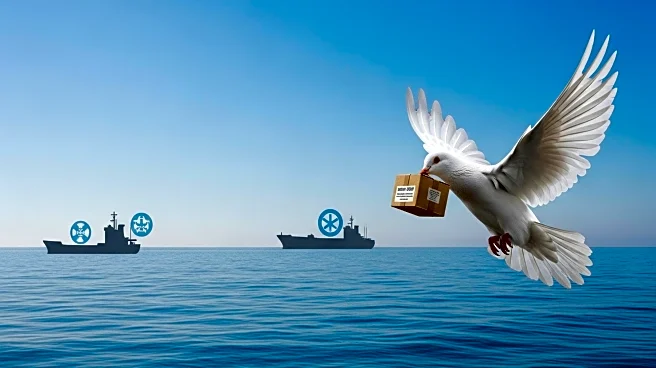What's Happening?
Israeli forces have intercepted more than a dozen boats from the Global Sumud Flotilla, which is attempting to deliver humanitarian aid to Gaza. The flotilla, consisting of over 150 activists from more than 20 countries, aims to protest the ongoing conflict in the region. Organizers reported that approximately 30 boats are still en route to Gaza, currently positioned about 46 nautical miles from the enclave's shores. The Israeli Navy has been accused by flotilla organizers of illegally intercepting the boats in international waters, describing the action as an 'attack on unarmed humanitarians.' Videos shared by the organizers show water cannons being used against the boats. Israel's foreign ministry confirmed that several vessels were safely stopped, and passengers are to be transported to an Israeli port for deportation. Among the high-profile participants is climate activist Greta Thunberg, who was seen calmly interacting with military personnel during the interception.
Why It's Important?
The interception of the Global Sumud Flotilla highlights the ongoing tensions surrounding humanitarian aid access to Gaza. This event underscores the complex geopolitical dynamics at play, as international activists challenge the blockade imposed by Israel. The situation raises questions about the legality and ethics of restricting humanitarian aid, which could have significant implications for international law and human rights advocacy. The involvement of high-profile figures like Greta Thunberg brings additional attention to the issue, potentially influencing public opinion and diplomatic relations. The blockade's impact on Gaza's civilian population remains a critical concern, with potential repercussions for regional stability and international diplomatic efforts.
What's Next?
The immediate next steps involve the deportation of detained activists by Israeli authorities. The remaining boats in the flotilla continue their journey towards Gaza, which may lead to further confrontations. International reactions are likely, with potential diplomatic discussions or condemnations from countries whose citizens are involved in the flotilla. The situation may prompt renewed calls for dialogue and negotiations regarding humanitarian access to Gaza. Activists and human rights organizations may increase pressure on governments and international bodies to address the blockade and ensure the delivery of aid.
Beyond the Headlines
The interception of the flotilla raises broader ethical and legal questions about the rights of humanitarian organizations and activists in conflict zones. It challenges the balance between national security concerns and international humanitarian obligations. The event may influence future policies on humanitarian aid delivery in conflict areas, potentially leading to changes in international maritime law or diplomatic protocols. The involvement of prominent figures like Greta Thunberg could shift public discourse, encouraging greater scrutiny of the blockade and its humanitarian impact.









